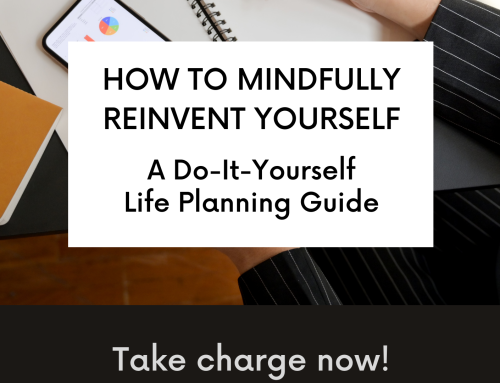
Once upon a time, I worked as a registered investment advisor and financial planner. This article is about the most valuable lessons a “retired” guy like me learned in the business of managing other people’s money and helping them retire.
I did not retire in the traditional sense of the word. I simply stopped working in a job or career, took a break, and figured out a new way to live my professional life. I never retired in the traditional sense because my assets are not where they need to be to support my ongoing lifestyle.
The other reason I continue to work is I don’t believe in retiring in a traditional sense. As you’ll see, while working in the business of retirement planning, I learned that retirement would never be for me. I’d always want to keep my body and mind active, and if I can create value for others for as long as I live doing work I love like writing, teaching, coaching, and creating new art, why would I want to retire from that?
Maybe I’m not the only one to realize traditional retirement isn’t all it’s cracked up to be. Most people believe success and happiness are about having a lot of money, passive income, and getting out of the “rat race.” But what if you know how to build a rich life regardless of how much money you have in your bank account? For me, that looked like quitting corporate America when I was 30 and starting a small business I could call my own, build, and sell one day.
Managing Other People’s Money
I started working as a financial planner in 1991. I was a young 30. My wife and I had two young boys. Janice was the Varsity stay-at-home mom. I quit working for Ritz Carlton hotels because I always dreamed of working for myself. I had some early help from a Scottsdale, Arizona firm. The owners of that firm got me started, but it wasn’t long before I started my own registered investment advisory practice.
My early mentors taught me the value of becoming the “most-trusted” advisor to business owners, executives, attorneys, doctors, accountants, and people from all walks of life. My clients hired me to help them plan for retirement, college costs, and life.
At the pinnacle of my success, my business partner and I managed over $150 million for approximately 300 families, or what we called “Households.” The recurring revenue to us as more than $1 a year. I was the junior guy.
When the partnership ended, I was back on my own hosting public seminars and teaching people how to take charge of their life planning and financial decisions. It was a very rewarding business that ended poorly.
The good news is I learned priceless lessons about building relationships, managing business risk, and making my creative efforts pay off for me more than I could have expected.
Life Planning and Money
The longer I worked as an investment advisor and financial planner, the more I learned about life planning and what made people truly rich, healthy, and happy. Most of my clients were “normal” people, not “uber-wealthy” people, although I did work with a few.
Have you ever met a really rich person who is absolutely mean, rotten, miserable, and dying inside? Me, too. In contrast, how much money did Mother Theresa, Gandhi, or Nelson Mandela make every year they lived a rich, pain-filled, purposeful, humble life of service? It’s easy to see that having money is not what makes us feel wealthy. It’s something else.
The difference is the mindset. One of the most eye-opening lessons for me growing up between a rich and not-rich family, and making a business out of managing other people’s money, and losing sleep over their investments, is there are lots of happy people living on Earth who don’t base their happiness on material possessions or happiness.
All you have to do is look at Bhutan, one of the least rich nations in the world, but the happiest. The reason for this is the measure of their success is Gross National Happiness. In America, we base our success on the growth of Gross Domestic Product, GDP. This is the measure of all the goods and services produced. America loves to consume, but we’re not happy or healthy. Look around for more evidence beyond the fact that we continue to reverse our life expectancy in America.
Sleeping Like A Baby
I used to lose sleep thinking too much about all the money my clients trusted me to oversee and manage. I literally lost track of the times I’d wake up in the middle of the night, cry, get held by my amazing wife and told, “everything will work out” as she did with our baby boys. Managed other people’s money made it difficult for me to stay happy.
It was not my intention, but I had grown to ta value money far too seriously. In going after making money, I chose the business of managing other people’s money. That created a lot of unnecessary worries, stress, and anxiety I didn’t know how to handle. Nobody warns you about that when you’re first starting your business. That’s why street smarts are so valuable.
There were never any stress management training programs for financial advisors, mostly fairly-lame motivational and sales training programs. Hundreds of thousands of investment advisors, financial advisors, financial planners, and so on work in the business “asset gatherers.” Most of the people you meet selling investments and insurance products are not professional money managers even if they pick stocks and other individual investments. Most of the people I know in the business excel at sales, building trust, and managing relationships.
My job was to place the client assets with professional money managers in the best asset allocation for the client’s needs and risk profile. I was the tender and holder of hands. It was a very rewarding business for many years. However, it was not an easy business to grow or manage without losing sleep. 100% of my income came from my commissions and fees. I have not had a normal “salary” since 1990.
One thing I learned about humans is how much we despise losing money. Despite my best efforts to manage extremely high-quality, conservative portfolio allocations, markets go through cycles and account values go down. That can freak otherwise normal people out in crazy ways. The longer I managed other people’s money, the more stressful my life became. The more stressful my business became, the number I felt. I didn’t understand the consequences of accumulated stress until later.
Imagine managing the financial future and almost all of the investments for over 125 families at one time. The number would vary, of course, but you get my point. What happened, in the end, is I let the stress and anxiety overwhelm me. When the market crashed in the Fall of 2001, I fell to the deepest, darkest depths of my financial, emotional, physical, and spiritual lows.
A Dark Day In August
At the end of my career as a financial planner and investment advisor, I sold out to a big brokerage firm. Within two years of that, I melted down. Selling my book of business and changing jobs was the worst business decision I ever made. I broke my contract with the buyer of my business. They sued me and I lost everything before finding a way to bounce back.
My last day working in the business was August 17, 2002. I cried after resigning. I’ll never forget my boss yelling at me, “Cliff, what the f@#$ do you think you could ever do if you leave here? What are you going to do if you resign and break your contract with us? I’ll f@#$ing ruin you.”
I’ll never forget the heat of summer blasting me like a campfire gone wild. It was one of the worst days of my life. I broke the contract I had signed for a five-year buyout of my book of clients. In truth, I had sold my soul. I walked into the house and told my wife it was over. She hugged me and told me everything would work out, but it took a while.
I lost all the money I made selling my client book of business, and to the stock market crash, I got clarity and confidence back building a different, more rewarding business. I lost it mentally when the money and cash flow went away.
Life’s Lessons Make Us Stronger
There’s nothing worse than keeping inside of us toxic, self-loathing emotions of shame, guilt, and resentment. My dark night of the soul taught me invaluable lessons. Now I get to share the lessons to anyone ready for the message.
It’s taken me fifteen years to process my experience, the meltdown of my mind, physical health, faith, and financial peace of mind. It all went away except for my family and friends, and enough hope to find a new moment of clarity, confidence, and faith.
If I were to resign again, and walk away from the business, I would call all of my clients I lost contact with during my crash. I would tell them that I was too broken and ashamed to let them know what happened to me in 2002.
I left my hard-won business forever. There are many times I miss aspects of my former business, but the business of life is better for me now. It’s true I’ve reconnected with many of my former clients, but with those I did not, I still want them to know that I blew it, but learned valuable lessons.
Here are my top “confessions” or lessons learned.
- I was always a better salesman and relationship manager than a money manager. I did my best to farm out the management of your money. I wanted to keep you safe and protect you from the emotional highs and lows of life, the markets, and dumb money mistakes we make. Yes, I had a degree in Economics from a private university. I had training in retirement planning, tax planning, estate planning, business banking, and a full range of skills I use today. But I didn’t know what I didn’t about life happening. I was too young.
- I did my best to always do the right thing for you. There were times I sold the highest commission product out of fear I would not make enough on the deal after splits with the firm. But I never put any of you as clients into “risky” or “bad” investments I would not own myself given the same circumstances. My policy was honesty and it is impossible despite that not to let money influence our recommendations. I never had a run-in with regulators. I ran a clean business then and now.
- I’m sorry I never said goodbye to you. The resignation decision was irrational. I was not of sound mind. I had sold my business to a person and company that did not align with my values or visions. Both parties intended well, I’m sure. But the unintended consequences of my closed mindset and a toxic workplace environment that would surely be on the local nightly news were it happening today. I was crushed when I walked out of my office on August 17, 2002. I was in utter despair, shame, and fear of the future leaving the business I had built from scratch behind. I’m sorry if you feel I let you down by not letting you know what happened.
- Take charge of your financial education. The more financially literate you are the easier it is to plan your life, save, invest, and manage your money. Take charge of your life plan and let the money be the vehicle that provides income now or income later. That’s what investing is about, as well as peace of mind. Hire people you trust with your head, not your heart. Be sure you’re not the next victim of another Bernie Madoff.
- Focus more on the quality of your life, not money itself. It’s okay to have lots of money if you don’t have to sell your soul to get it. Being rich is a state of mind. Rich people think, talk, and act differently. Most rich people I know are phenomenal humans. They have families, jobs, and problems just like all of us. But don’t make your life all about the money and having more stuff. Like the concept of retirement sitting around your house and playing putt-putt golf, choose to live, work, and make a difference based on your unique interests, skills, and abilities.
Grateful for All There Is
Everything happens for a reason. I learned valuable lessons that set me up to start a new business, and eventually to sell it also. I’ve grown to the point in my life where I can be grateful for all there is, and that’s progress for a guy who used to try to control what can’t be controlled.
I bounced back and got through the dark times. I’m grateful to my wife, family, and close friends who stuck by my side. But I still have sad dreams during which I am working in a big brokerage firm and life is not fun.
Today, I help business owners, leaders, and teams manage their mindset. I get to create strategic action plans, ebooks, best-selling books, articles, videos, coaching, and training programs including the customized workshops. I teach and share “radical clarity” as a process for creating a strategic plan for a better business, career, and family life.
What is clarity? Clarity is a feeling of joy, contentment, confidence, and love of my work that is worth more than any amount of money I ever earned managing other people’s money.
If I can find clarity, so can you. Clarity is the brand I use for all of my new content, coaching, and training programs. Sign up here for my email updates if you want to be on the list.
The most important thing I can do as a business leader is making sure I’m doing the right thing for my clients, family, and neighbors. I get to help business and other leaders plan a richer life and I still get to help others sleep well at night. For that, I am grateful.
Do you have a comment or question? Feel free to leave a comment here or contact me here.
P.S. Want a free, online preview of my Clarity Peak Leadership Mindset Coaching Program and training workshops? Click here.




Nice post, thank you for sharing this information. Really helpful post.